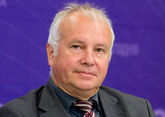In recent years, Moscow and Washington have regularly accused each other of violating the Treaty on Intermediate-Range and Shorter-Range Missiles (INF). And although NATO assures that if the treaty expires, the alliance will not deploy new land-based nuclear weapons in Europe, the situation remains very tense. In an interview with Vestnik Kavkaza, German political scientist Alexander Rahr comments on what is happening.
- Alexander Glebovich, can Germany and the EU somehow help the United States and Russia return to the negotiating table on the INF Treaty? What opportunities does Germany have? And where is the place of Germany in this situation?
- It seems to me that Germany does not use all its strength and all its capabilities in order to reconcile the West and Russia. The point is not that the United States and Russia are in conflict. A certain amount of conflict is produced and exists in Europe, and not just in America. The US has its own agenda and troubles, its anger at Russia. And Europeans have their own geopolitical and value conflicts. I think that in this situation Germany should try to do everything possible to detente the issues of disarmament. There should be German’s self-interest in not becoming a front-line state where the nuclear missiles will be placed. Germany is vitally interested in Moscow and Washington (and, best of all, Beijing joining them) to start the constructive disarmament talks. The main thing is that there should be no nuclear missiles in Europe.
- What incentives can Germany offer to Moscow and Washington?
- It can only explain that Europe cannot become a target for the enemy - Russia or, maybe, China- like it was during the Cold War. Europe achieved peace through much suffering after the end of the Cold War, after the fall of the Berlin Wall. But no one could have expected that 30 years after the fall of the Berlin Wall, the medium-range missiles would be placed in Germany. It just does not make sense for Germans. But at the same time, Germans can do nothing. They do not want this, but on the other hand, Americans demand solidarity from them. Poles and Balts have their own agenda in relation to Russia - to take revenge on Russia for 45 years of communism and for many other things.
- If you poll the population of Germany, where the pacifist sentiments are strong, the overwhelming majority will oppose the deployment of new American nuclear missiles in Germany and Europe. Do you assume that the people may say their firm ‘no’?
-Such pacifist and anti-American sentiments were much stronger in the 1980s. Despite the overwhelming majority of those who protest and do not want any missiles on German territory, under the government of Helmut Schmidt - the Social Democrats - Americans delivered them, and Germany, or rather its political elite, did not oppose.
Indeed, there is a complete discord in what people (the majority of Germans believe that they have generally reconciled with Russia and do not understand the meaning of the new Cold War) and representatives of the ruling elite want. The elite must obey the American interests, nothing can be done here, Americans morally and financially put pressure on Germany. The United States constantly reminds us that it saved Germany from communism during the Cold War and restored its economy. And at the same time, Washington has other allies in Europe - Poles, Balts - who remind Germany of its guilt, in particular, the signing of the Molotov-Ribbentrop Pact, frightening Germans with these ghosts of the past. And Germans are very affected by this, because, in principle, they are aware of their guilt for the Second World War, they understand that this should never happen again. Therefore, they are now in such an unenviable situation, where, on the one hand, they do not want all this, and on the other hand, they cannot say ‘no’.
German politicians tell me that there are historical resentments on the part of the Eastern European countries. They say that they need to be understood because they suffered from communism for 45 years, they were constantly divided, they were victims of both Germany and the Soviet Union, so the history should not be repeated in any way. And therefore, it is necessary to show maximum solidarity. When I object that this is happening to the detriment of our partnership with Russia, it can lead to a new cold war, since Russia has its own security interests, in response, they just give me a shrug and say: “For us, the interests and world outlook of our new European members, NATO and the EU are closer than the Russian fears, discontent and interests.”
Recruits, new members of the EU and NATO, entered these associations for one reason - to defend themselves from Russia, which they consider an enemy. This situation complicates any attempt to resolve the conflict, because these countries do not want reconciliation with Russia, and Russia simply does not take these countries seriously, saying: “Why should we take them into consideration, who are they? They are our former vassals, and now they are American vassals. What can we discuss with them? ”And this is forcing more and more fears and heightens the conflict within Europe.
- How can Germany ensure its own security in such a situation? After all, Germany now has no effective conventional armed forces. There are no nuclear weapons. How can Germany in such conditions, when the relations with the Trump administration are not at the highest level, and there is a tension in the relations with Russia, secure its long-term national security interests?
- Indeed, Germany has no serious army. Now the agenda is the fight against terrorism, but it is the task of the internal agencies. The intelligent services are more or less able to cope with this task, they hardly manage to strengthen the borders in order to restrain the flow of refugees. In fact, this is the main challenge facing Europe. Separate European armies, I think, could not do anything even in the Arab world. Indeed, for 50 years, Europe was not dealing with its own weapons and laid this obligation on Americans. Europe appointed the US as the commander in chief of all security issues. Now it is necessary to clear up this mess because the American president thinks more like a businessman and less like an ideologue. Trump says bluntly: “You have to pay for your safety. You have no army. "
He says that Europeans must pay for American soldiers and missiles that the US will deploy. In fact, he brazenly demands that Europeans pay for Pax Americana. This attitude reminds the relations with vassals - we protect you, then we will take tribute from you, so you must pay, if you want to be friends with us; we don’t actually like you, but the circumstances are such that we need to protect you, and you will pay for this protection. This is a new development in transatlantic relations.
Some countries are ready to submit to this harsh American dictates with pleasure. This is whether some masochistic feelings or desire to conflict with Russia. Other countries, Germany, France, do not want this.
Germany understands that the security issues around Europe are becoming very acute and the situation is aggravated. But Germany simply does not want to give money for tanks and aircraft. The country believes that if we increase military budgets and budgets for our own security, then they should be spent on the means for preventive policy in same Africa and the Middle East. This money can be directed, first of all, to stopping the migration flow, including the flow of terrorists to Europe. I think Germany regards this but not Russian missiles as the main challenge and threat.
- Yes, but in this case, Germany will not buy American weapons, which also plays a role in the American requirements.
- Yes, it also plays a role. The US is interested in Europe buying American gas instead of Russian, and American weapons, so that America will be good at the expense of its vassals, who should become useful to Americans in this way.
This is an interesting moment in history, because it is under question what will happen to the Atlantic relations, and it is not known what will happen to NATO. NATO, however, has now accepted Macedonia, but I think the further expansion is impossible. Ukraine will not be accepted, Georgia - either. So the question is - why do we need the NATO bloc?
- What is your forecast for the development of the current situation? Will Germany be able to find some kind of balance, a verified solution for the emerging geopolitical situation? Or will everything continue by inertia, as it is happening now?
- I hope that Germany will be courageous enough to find new forms of its status as the EU leader. But today I am very pessimistic about this because the American spirit here is very strong. The elites are closely associated with America by their career and worldview - they studied there, built careers, they belong to different structures, foundations, and so on. Today I do not consider the idea of an independent Europe under the authority of Germany and France to be real. My vision that we are moving slowly but surely (this is a very pessimistic forecast, and I wrote about this in my last book, “2054 - Putin decoded: a political thriller”) to a new bloc system. Somehow, the transatlantic alliance under a different name will continue to exist, but its condition will be weak, and its policy will force Eurasian countries to unite in alliances - India, China, Pakistan, Russia, Turkey and Iran. China, in the first place, will create its own alliances, its connections that will grow stronger and stronger. I think that in Asia, the military security structure will soon grow before our eyes. It can become quite serious and able to compete with NATO.










